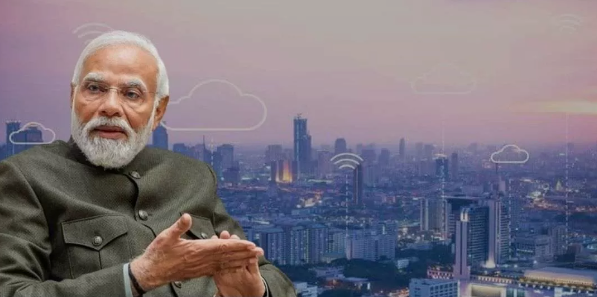Government Approves 12 New Industrial Smart Cities (GS Paper 2, Growth & Development)

Context
- On September 5, 2024, the Union Cabinet approved the establishment of 12 new industrial smart cities across six major industrial corridors in ten states under the National Industrial Corridor Development Programme (NICDP).
- These cities will be developed in Uttarakhand, Punjab, Maharashtra, Kerala, Uttar Pradesh, Bihar, Telangana, Andhra Pradesh, and Rajasthan.
- This initiative aligns with India’s broader goals of sustainable urban development and economic growth.
What is an Industrial Smart City?
Definition and Objectives:
An Industrial Smart City integrates advanced technologies and data analytics to enhance industrial operations and promote sustainable development. The primary objectives are:
- Attracting Foreign Investment: By offering ready-to-use infrastructure and strategic locations.
- Boosting Domestic Manufacturing: To strengthen India’s position in global value chains.
- Driving Employment: Generating both direct and indirect job opportunities.
Key Features:
- Plug-and-Play Infrastructure: Industrial parks with ready-to-use facilities that allow businesses to commence operations immediately.
- Walk-to-Work Concept: Urban planning that encourages living near workplaces, reducing reliance on vehicles and promoting pedestrian-friendly environments.
Development Framework:
- The NICDP, which includes the development of these industrial cities, aims to create a competitive industrial ecosystem by integrating residential and commercial spaces.
- This program is managed by the National Industrial Corridor Development and Implementation Trust (NICDIT) and the National Industrial Corridor Development Corporation Limited (NICDC). Invest India will assist in marketing these projects, and Special Purpose Vehicles (SPVs) will be established for their implementation, with a projected completion timeline of three years, subject to state cooperation.
Key Features of the Approved Industrial Smart Cities
Alignment with National Goals:
- Economic Targets: The projects support the government’s aim to achieve USD 2 trillion in exports by 2030.
- PM Gati-Shakti National Master Plan: These cities will be integrated into this plan, focusing on multi-modal connectivity to improve logistical efficiency and streamline supply chains.
Significance:
- Foreign Direct Investment (FDI): Expected to attract investments from countries like Singapore and Switzerland.
- Job Creation: Projected to generate around 10 lakh direct jobs and up to 30 lakh indirect jobs.
- Investment Potential: Estimated at Rs 1.5 lakh crore.
Sustainability:
- The cities will incorporate ICT-enabled utilities and green technologies to minimize environmental impact, aligning with India's commitment to sustainable development.
Challenges Associated with Industrial Smart Cities Development
Technological Integration and Infrastructure:
- Upgrading Old Infrastructure: Adapting existing urban infrastructure to support advanced technologies like IoT devices, high-speed internet, and data centers can be costly and complex, especially in older cities.
Data Privacy and Security:
- Protecting Data: Handling vast amounts of data from smart devices requires robust security measures and continuous monitoring to prevent breaches.
Funding and Investment:
- Securing Investment: Attracting sufficient financial investment involves demonstrating long-term benefits and a favorable Return on Investment (ROI) to stakeholders.
Public Acceptance and Awareness:
- Addressing Concerns: Engaging with citizens about privacy issues, potential job losses due to automation, and lifestyle changes is essential for gaining public support.
Governance and Policy Issues:
- Navigating Regulations: Implementing smart city projects involves managing changes in local laws, regulations, and policies, which can be time-consuming and politically sensitive.
Way Forward
Regulatory Reforms:
- Streamline Processes: Simplify and digitize administrative procedures, harmonize regulations across different levels of government, and enhance transparency to boost investor confidence and operational efficiency.
Efficient Land Acquisition:
- Create Land Banks: Develop mechanisms to streamline land acquisition, ensure fair compensation, and use innovative approaches like land pooling to expedite the process.
Sustainable Development:
- Conduct Assessments: Perform thorough environmental assessments and promote sustainable business practices. Invest in infrastructure that supports sustainable growth.
Skill Development and Workforce Training:
- Establish Training Centers: Set up vocational training programs, collaborate with industries for tailored training, and provide incentives for businesses to invest in workforce development.
Public-Private Partnerships (PPP):
- Foster Collaboration: Encourage public-private partnerships to share risks and rewards, ensuring transparency and accountability in governance while maximizing the benefits of industrial smart city development.
Conclusion
- The establishment of these 12 new industrial smart cities represents a significant step towards modernizing India’s industrial landscape, enhancing global competitiveness, and promoting sustainable urban development.
- Addressing the associated challenges effectively will be crucial in ensuring the success and long-term benefits of these projects.


